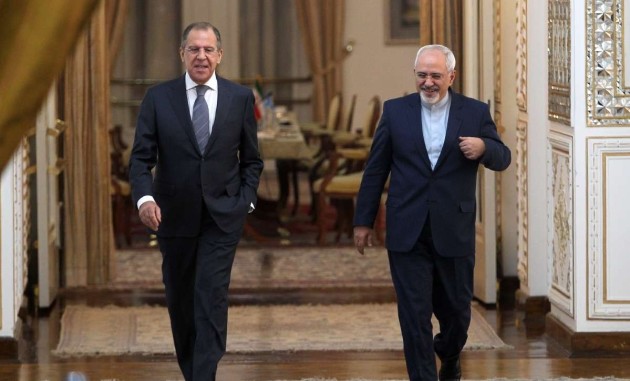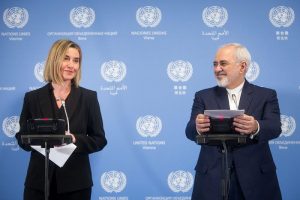by Mark N. Katz
Russia has long called for a negotiated settlement of the Iranian nuclear issue. Moscow has played an important part in the ongoing negotiations over this issue between the P5 + 1 (America, Britain, France, Germany, Russia, and China) on the one hand and Iran on the other. But as these talks approach what may be an actual final agreement by the end of June, some Russian observers have noted that there is anxiety in Moscow about what this agreement will mean for Russia.
Georgy Mirsky—one of the most senior Russian experts on the Middle East—told the Washington Post in April that, “A few years back, I heard one of our diplomats say: ‘A pro-American Iran is more dangerous for us than a nuclear Iran.’”
More recently, Fyodor Lukyanov (editor of the journal “Russia in Global Affairs” and one of Russia’s leading foreign policy experts) noted in an interview that “there are a lot of people here saying, ‘Why should we help the Americans to reconcile with the Iranians, or the Iranians to reconcile with the Americans? If Iran is not isolated, it can turn to the West, at least in terms of its economy, in terms of contracts and so on. It’s not in our interests.’”
In this regard, Lukyanov raised the possibility that Moscow’s decision to resume its agreement to sell S-300 air defense missile systems to Iran which Medvedev canceled in 2010 might be motivated to restore Russian ties to Tehran (which reacted angrily to the cancellation of the sale) at a time when Moscow anticipates Iranian-American relations are about to improve. Although this might appear to be an unrealistic concern in the West, Russian pessimists fear that an Iranian nuclear accord will soon lead to European and even American arms sales to Iran. Moscow does not want to be left out, and so decided to demonstrate Russian willingness to supply weapons to Tehran.
This line of reasoning (which, it must be noted, neither Mirsky nor Lukyanov share) is an example of pessimistic, or “worst case,” thinking. What is especially noteworthy is the stark contrast between how American and Russian pessimists view the prospect of an Iranian nuclear agreement.
In the pessimistic American view, the achievement of an Iranian nuclear agreement is a bad thing because not only is Iranian hostility toward America and its allies seen as continuing, but American pessimists fear that Tehran will be in a position to acquire nuclear weapons more easily after signing a nuclear agreement because Western sanctions will then be eased and Washington will have been “lulled into complacency” about Iranian intentions.
In the pessimistic Russian view, by contrast, the achievement of an Iranian nuclear agreement is a bad thing because Iran is seen as likely to comply with the terms of a nuclear accord, and so Russian pessimists fear that the achievement of such an agreement will lead to an Iranian-American rapprochement, greatly expanded trade and cooperation between Tehran and the West, and a significantly reduced need for Russia on the part of an Iran that has good relations with America and the West.
This pessimistic Russian expectation might be expected to induce Moscow to undermine the achievement of an Iranian nuclear accord. But Lukyanov, in the same interview, denied this. Moscow, he noted, also wants to prevent Iran from acquiring nuclear weapons. And even though the signing of a nuclear accord might well lead to the Iranian-American rapprochement that many in Moscow dread, Russia has no interest in harming its own ties to Iran by trying to block something Tehran itself wants. Besides, he noted, “They will come to terms with the Americans anyway, with us or without us, now or later.” In other words, if Washington and Tehran are determined to improve their relationship, a Russian attempt to prevent them from doing so will not only fail, but will also lead to the needless deterioration of Russian-Iranian relations.
Of course, if the opponents of a nuclear accord in Washington and among America’s Middle Eastern allies manage to prevent the Obama Administration from agreeing to a final nuclear accord with Iran, Moscow can be expected to blame the U.S. for the failure of the negotiating process as well as take advantage of the resulting deterioration in Iranian-American relations to greatly expand Russian-Iranian cooperation. Obama’s Republican opponents (as well as anti-Iranian governments in Israel and the Gulf monarchies), then, may be in a stronger position to prevent the Iranian-American rapprochement which Russian pessimists are so fearful of than Moscow itself.
But at a time when tensions between Russia and the West have greatly increased over Ukraine and Europe more broadly, it does not seem that America’s interests would be well served through increasing Iranian incentives to cooperate with Moscow. Instead of just worrying about the dangers that an Iranian nuclear accord could lead to, American pessimists ought to consider what the dangers of not achieving such an accord might be.
Photo: Iranian Foreign Minister Javad Zarif and his Russian counterpart Sergei Lavrov on December 11, 2013.






Jim Lobe, thank you for your postings. Your postings seem to attract and promote intelligent comments and conversations!